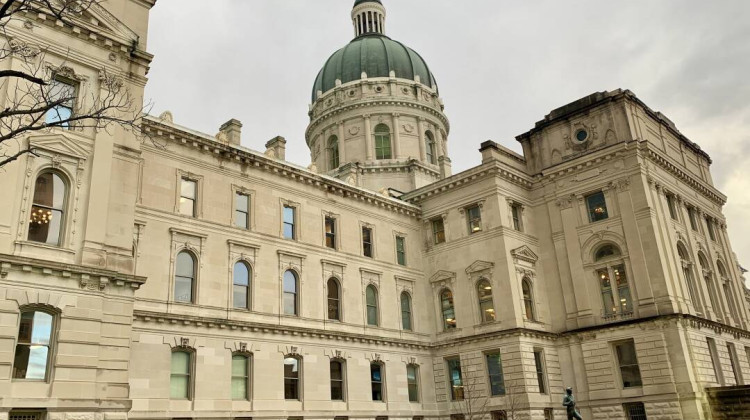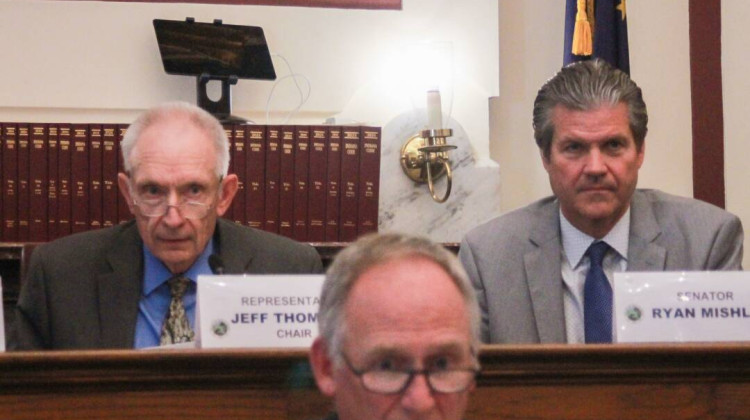
A new home being built just outside of Ann Arbor, Michigan. In communities like Bloomington — which already have tight restrictions on development — Indiana Business Research Center's Phil Powell said environmental regulations can have more of an effect than they might in other parts of the state.
Dwight Burdette/Wikimedia CommonsGroups that represent home builders and developers often talk about how environmental regulation adds to the cost of building a new home — making home ownership unaffordable for many Hoosiers.
It’s one of the main arguments made by the Indiana Home Builders’ Association for everything from rolling back wetland protections to preventing gas stoves from being banned in new developments.
According to the National Association of Home Builders, government regulation overall accounts for about 24 percent of the final price of a new, single-family home.
For a multi-family development, it’s more than 40 percent.
But just how much do environmental regulations specifically factor into the price of a home? Indiana cut protections for most of its wetlands in 2021 and federal environmental regulations have swung wildly through the Obama, Trump and Biden administrations.
Yet the median price of a home – including condos and townhomes – in Indiana has gone up steadily in about a decade, from about $125,000 in 2014 to $242,300 in 2023. Indiana Public Broadcasting talked to housing experts to get a better idea of what’s happening.
Why is housing so expensive right now?
Experts say simply put — it’s a problem of too much demand and not enough supply. Phil Powell is the executive director of the Indiana Business Research Center at the Indiana University Kelley School of Business. He said a big part of it is that millennials, who put off getting married and having children, are finally doing so.
“So you have a huge number of new families coming into the market wanting to move out to the suburbs or have their own house — and that's the biggest driver of higher prices,” Powell said.
Doug McCoy is the Al and Shary Oak director of the IU Center for Real Estate Studies. He said wage growth and migration are also spurring demand.
“I think we're about 30 years out is where we're going to start to, arguably, see less demand as far as if we look at the demographics. But it's probably not true because of what's happening with immigration — and we probably need immigration, right, to give us the labor that we need and so forth,” McCoy said.
Let’s not forget inflation — McCoy said that’s increasing the cost of materials like wood, which also drives up home prices.
How much do environmental regulations factor into home prices?
Both Powell and McCoy said environmental regulations aren’t the biggest drivers when it comes to home prices, but all of those small requirements do add up.
“If you have a lot of regulations that restrict where people can build, that’s going to add to housing prices. It’s not going to be the major driver of higher prices, but it will be an aggravating factor,” said Powell.
In communities like Bloomington — which already have tight restrictions on development — Powell said environmental regulations can have more of an effect than they might in other parts of the state. That can increase home prices by 10 to 20 percent.
Powell said it could be a few years before we see the effect on home prices of something like the 2021 changes to Indiana's wetlands law.
Though for regulations that encourage energy efficiency, a federal analysis suggests the cost to the homeowner would be offset through lower energy bills.
How can cities and counties address the housing supply?
McCoy said, though it’s hard to reduce the demand for new homes, there are things that communities can do to help increase the supply.
He said in many areas of Monroe County, developers have to build on at least 2.5 acres of land.
“So for a builder to build that home and to make any profit at all — and that's how they're feeding their family — they're going to have to build a larger home because they're already starting with a higher land cost,” McCoy said.
McCoy said if developers were allowed to build on half an acre, a quarter of an acre, or even an eighth of an acre — that could bring prices down in Monroe County. It could also decrease infrastructure costs if homes are closer together.
McCoy points to an area just east of Indiana University Bloomington’s campus where several small homes were built to house soldiers after World War II.
“People were able to come back and start their families and have that whole sense of homeownership and so forth. And I'm sure many of those folks lived there for three to eight [years] — maybe some made it long-term — but a lot of them then transitioned to their next home as we are used to seeing happen. So it shows that we know how to do it,” he said.
Join the conversation and sign up for the Indiana Two-Way. Text "Indiana" to 765-275-1120. Your comments and questions in response to our weekly text help us find the answers you need on statewide issues, including our project Civically, Indiana and our 2024 legislative bill tracker.
What state legislation could help increase the supply of affordable homes?
The Indiana legislature passed a law last year that aimed to address the supply issue. HEA 1005 set up a loan program to help communities afford the infrastructure costs to make new housing developments.
But nothing in the law guaranteed that money would go to help those most in need — lower-income Hoosiers, often renting. Andrew Bradley is the policy director for Prosperity Indiana — which advocates for lower-income housing.
“So what that means is that Indiana is using taxpayer money to subsidize the production of new, market-rate profitable housing, but not necessarily including anything to make sure that it's affordable on the consumer end,” he said. “And when you have a gap of over 120,000 affordable and available units statewide for the lowest income renters, that just puts more new housing out of reach and is hoping that there's some sort of trickle down effect that will eventually help those other Hoosiers. But really, there's nothing in the legislation that ensures that.”
Bradley said ultimately the law won’t solve Indiana’s most pressing housing issues if it’s not addressing the largest housing gap in the state.
Some Indiana communities could lower housing costs without even building new homes, with a little encouragement from the legislature.
“For example, if you do have an older house that, say, had six bedrooms. Well, perhaps that could be converted into three bedroom duplexes and help meet that need in the community while still being able to accommodate a relatively large-size family. But some of those local solutions have been preempted [by the General Assembly],” Bradley said.
Specifically, Bradley said Indiana is one of only a handful of states to outlaw inclusionary zoning— which sets aside a certain amount of units in a new or renovated housing development for lower and moderate income residents.
Bradley said Indiana could also do more to ensure the housing already on the market doesn’t fall into disrepair. By law, landlords are required to provide tenants with “a safe, clean, and habitable” unit. But Bradley said Indiana doesn’t have many laws on the books that help cities or tenants enforce that.
Unlike most other states, tenants in Indiana can’t withhold rent until necessary repairs have been made or make those repairs themselves and deduct it from their rent.
“Bad actor landlords don't ever have to, and aren't ever called to, account for not keeping up a safe and decent place to live. That can artificially deplete the stock of housing within a community, driving up costs for other consumers and frankly, putting additional pressure on community based services,” Bradley said.
Bringing all stakeholders to the table
Controversy over Indiana’s wetlands law suggests important conversations on housing solutions don’t take place often enough between developers, environmental advocates, and regulators.
Part of the 2021 law to remove protections for most of Indiana’s wetlands set up a task force to study the issue. But the member representing home builders didn’t show up to the meetings. In this latest law signed by Gov. Eric Holcomb on Feb. 12, wetland advocates and experts say they weren’t consultedon the bill.
The Indiana Business Research Center’s Phil Powell said there are likely more win-win solutions out there that can help create affordable housing while protecting Indiana’s environment. He said it’s the job of political leaders to compel these groups to come together to find solutions that everyone can agree upon.
“And if somebody is not showing up, that means the leadership is not strong enough. That is the way that our politicians in the state of Indiana need to look at it. Otherwise, we just fall back to developers versus environmentalists and we try to look at it as, ‘One side is wrong and one side is right’ — and that's just not the way to look at it,” Powell said.
Rebecca is our energy and environment reporter. Contact her at rthiele@iu.edu or follow her on Twitter at @beckythiele.
 DONATE
DONATE






 Support WFYI. We can't do it without you.
Support WFYI. We can't do it without you.